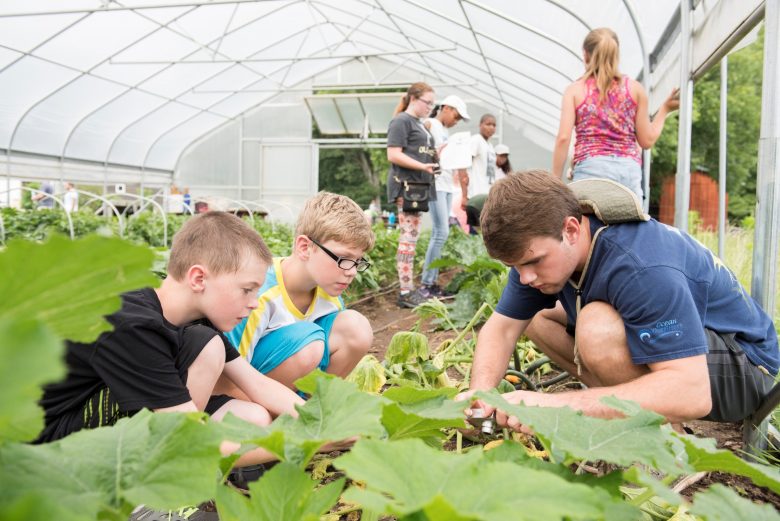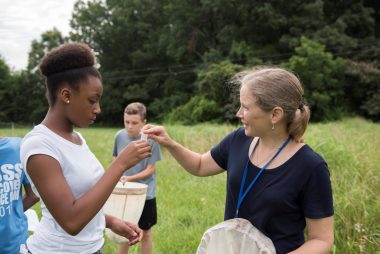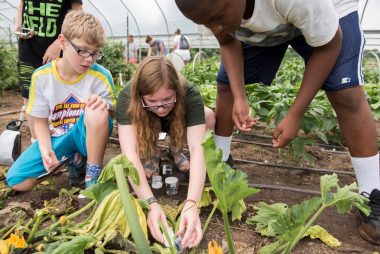Assistant Professor of Biology Jen Hamel headed a program focused on insects using the resources Elon’s Loy Farm offers.

The more than two dozen rising seventh- and eighth-grade students were guided by Jen Hamel, assistant professor of biology, as they worked their way through a patch of “Piedmont prairie,” garden plots and greenhouses at the farm collecting and examining insect specimens. The half-day session was included in Discover Science, a STEM camp organized by Western Alamance Middle School teacher Melaine Rickard that’s part of a larger Students Discover initiative funded by the National Science Foundation.

“You can find them anywhere,” Hamel said of insects, offering a bit of trivia in the fact that an acre of land can contain as many as 40 million insects. “It’s about not being afraid of them and figuring out how to catch them.”
Loy Farm offered the perfect classroom for the budding entomologists. In the patch of Piedmont prairie at the farm, an ecosystem native to North Carolina that used to be prevalent in this area, students collected insects including katydids, grasshoppers, beetles and skippers (which look like small butterflies) by hand and using sweep nets. Within the rows of vegetable plants at the farm, the students identified insects by the roles they played, including predators, herbivores and parasites.
Inside the 3,000-square-foot High Tunnel greenhouse, the students gathered data about insects found on squash plants by taking pictures of the insects and writing down descriptions. That information will be used by the The Squash Project and The Great Pumpkin Project, two N.C. State University research initiatives designed to track plant pathogens around the country.
 Working with Hamel to help educate the students were Matthew Sears ’18 and Breanna Coughlin ’18, both Elon College fellows who are conducting research with Hamel. Also participating as part of the research group and assisting the students was Bradley Lauck, a Southern Alamance High School senior who is an Elon Academy scholar.
Working with Hamel to help educate the students were Matthew Sears ’18 and Breanna Coughlin ’18, both Elon College fellows who are conducting research with Hamel. Also participating as part of the research group and assisting the students was Bradley Lauck, a Southern Alamance High School senior who is an Elon Academy scholar.
Back at McMichael Science Center, the students processed what they had learned through their fieldwork in the morning, offering insights into what they had learned that morning, something “cool” they had found and an area they want to explore more in the future. For some, Hamel said, it was an opportunity to overcome apprehension about insects and learn how they fit into the larger ecosystem.
Hamel said Elon and Loy Farm offered “a great fit” for an insect-focused day within the Discover Science camp. “We were able to offer an experience that helped students learn how abundant and diverse insects are, and the different ways you can collect them,” Hamel said. “This was an opportunity for these students to be ‘citizen scientists’ and use Elon’s resources to help grow their scientific knowledge.”


